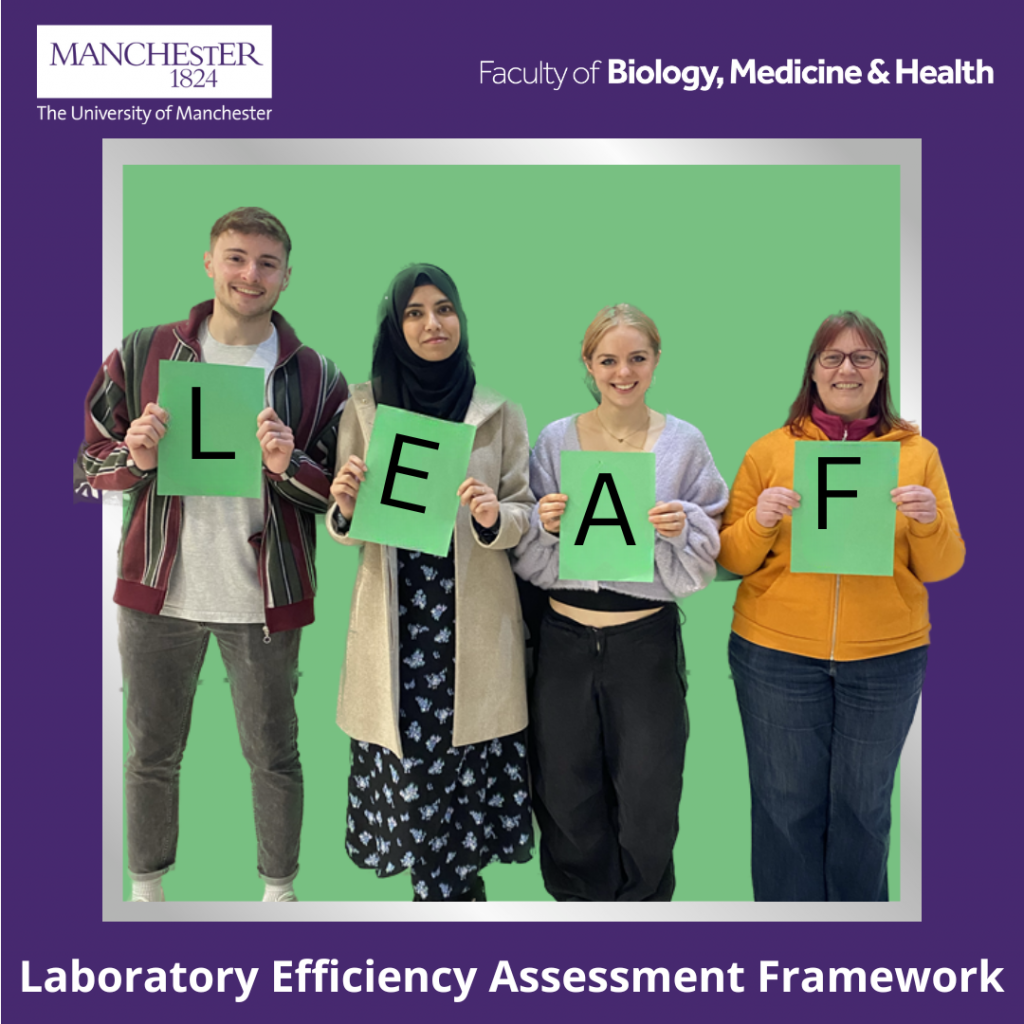
Creating a ‘culture shift’: Dr Isobel Taylor-Hearn’s impact on sustainability in FBMH
Effective sustainability initiatives require collective effort, but it often takes a committed individual to lead the way. Dr Isobel Taylor-Hearn has helped bring environmental sustainability to the forefront of lab work in FBMH through LEAF.
LEAF (Laboratory Efficiency Assessment Framework) is a UK lab accreditation system, with clear criteria for equipment use and lab systems available to help labs meet sustainability targets. The Faculty requires all labs to be at least Bronze-level LEAF certified by July 2025.
During her time at the University, Bel supported Dr Maggy Fostier, Associate Dean for Environmental Sustainability, to embed sustainable practices across Faculty research spaces. She is a leading LEAF champion and auditor, enabling colleagues to embrace sustainable approaches within their work.
Bel has played a key role in promoting LEAF in the Faculty and beyond. She has delivered training sessions for lab members, conducted LEAF audits on labs, and helped her lab group become the University’s first LEAF Gold-accredited lab.
Sustainable approaches haven’t always been so widely adopted. When Bel began her PhD in 2019, she found that energy-intensive activities and unsustainable methods were accepted as standard in many labs.
Many of these issues arose from legacy practices that persisted without new lab members questioning their relevance or alignment with sustainability goals. The LEAF training courses have improved awareness of unsustainable practices, such as leaving fume cupboards open and TC cabinets turned on overnight.
‘LEAF champions have taken their learning from the training and spread the word to their labs, and embedded a new culture,’ Bel says. ‘It does really seem like a culture shift.’
78% of PIs within the Faculty now have a LEAF champion in their team, and 50% of PIs have a LEAF award (16% Bronze, 67% Silver, 43% Gold).
Bel will soon be finishing her post-doctoral placement at the University, but she’s keen to see sustainable practices continue to grow.
‘You can start small,’ she adds. ‘Change happens slowly, but it definitely does happen if everyone collectively works together.’
Contributions to sustainability come in all shapes and sizes. Whether it’s attending a LEAF training course, becoming a LEAF champion, or getting involved behind the scenes, there’s something for anyone who wants to help make a difference.
If you’d like to support sustainability initiatives in FBMH, contact Dr Maggy Fostier (maggy.fostier@manchester.ac.uk), or ES Officer Izzy Hoggmascall (srbmh@manchester.ac.uk).
The ES team runs a regular 2.5-hour interactive workshop to introduce LEAF and 6R, offering practical advice to make our labs more sustainable. Sign up here to attend the next session.
5 changes to make a big difference in the lab
Take stock of what you have – Use a lab management system to evaluate your resources. Excess equipment, plasticware and samples can be rehomed in labs across FBMH – take a look at Lab Goods 4 Reuse to find out more.
Shut the sash – A fume cupboard left open uses as much energy as ~2 UK households. This is halved when the hood is clutter free and closed when not in use. If all labs in FBMH made this simple swap we could save the equivalent energy of 170 homes!
Check the temperature – A ULT freezer set at –80°C uses as much energy as an average UK household. Increasing the temperature by 10°C can reduce energy consumption by 30% while preserving sample integrity.
Have a clear out – Got expired or useless samples? Clearing out cold storage makes equipment more efficient and finding samples easier. An organised lab prevents unnecessary orders, saving energy and money.
Use the right bin – In FBMH we can recycle card, paper, hard/soft plastics, stationery, batteries, glass, lightbulbs, ice packs and tip boxes!

0 Comments